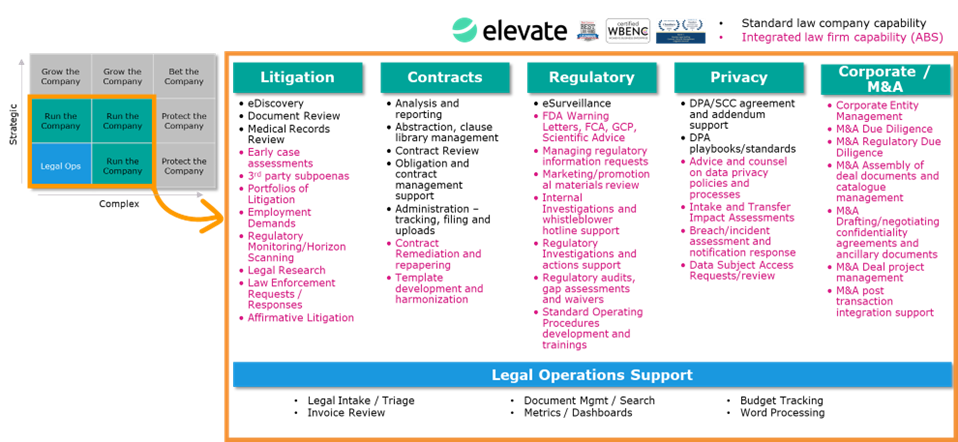Elevating the Business Through Routine Legal Activities
October 06, 2023
Consulting law department consulting legal operations law department corporate law
In Part I of this series, we outlined strategies to ‘run legal like a business’ so that a law department drives maximum business value. Here, we focus on two of those strategies, each concerned with finding better and faster ways to manage and complete routine legal work.

By ‘routine legal work,’ I mean matters of lower complexity, greater volume, and higher frequency yet heavily aligned to a business’s day-to-day operations. Though these routine legal activities are seldom popular among in-house lawyers, they are critically important to enabling and generating revenue. They require sound and reliable solutions that deliver speed and effective delivery.
Increasing numbers of law departments are approaching routine legal work by implementing what my colleagues and I refer to as ‘elevated models’ (e.g., legal shared services, support from alternative legal service providers (ALSPs), self-service technology, or a combination of them). Yet many GCs remain cautious. Shared services at scale are not new to large companies, but using that approach with legal work is a relatively recent development. (That said, some GCs – like Elevate’s Steve Harmon, who implemented Cisco’s award-winning legal services model that kept legal costs generally flat while revenues scaled 3x – have been doing it for decades!).
The resistance within law departments to ‘move the cheese’ on internal legal teams typically stems from absence of cost pressure and fear that making a change away from existing lawyers will diminish the quality of the work in question. Yet, numerous implementations have consistently demonstrated the overall company-wide benefits far outweigh the risks. The reality is, at some point, every GC must address how to scale their law department’s routine legal work more affordably.
When my colleagues and I meet with general counsel beginning to consider alternatives to an ‘everything in-house’ approach, three questions predominate:
- Where and how are other companies leveraging legal shared services and using law companies / ALSPs for support?
Many GCs are surprised to learn how many different ways other law departments are leveraging shared services, ALSPs, and self-service technology. The diagram below details the variety of areas in which Elevate is currently supporting customer legal shared services teams across different legal areas – including ones potentially relevant to your law department:

Of all of the above, the most common areas of legal shared services implemented are:
- Routine contracts intake, review, negotiation, and closeout
- Disputes and investigations, eDiscovery, document review, and third-party information requests
- Regulatory content reviews, compliance monitoring, and contract audit and remediation
- Legal operations such as invoice review, matter intake, and vendor onboarding
- What are the typical benefits my company can expect in return for shifting to elevated delivery models?
The most common benefits include:
- Faster cycle times on critical, day-to-day business transactions
- Lower overall costs (both business and legal) per transaction
- Maximised value of in-house lawyer time towards internal client and strategic business matters
- How much of that depends on implementing technology and self-service tools?
Proper intake and workflow technology are critical to achieving the best results. However, it is not necessary to get the initial results. Many companies begin by shifting and stabilising the work as an initial stage of validation. Only after that do they integrate technology as an enhancement. The ultimate goal is to leverage self-service technology that digitises basic responses and facilitates document generation (e.g., standard contracts) without the involvement of the law department – but that should only occur after creating proper guidelines and completing readiness steps.
In our next posts, we will dive deeper into some of the most common legal shared services and law company usage areas mentioned above as well as discuss the recommended steps involved in getting your legal leadership team educated and behind these initiatives.
Back to Expertise


